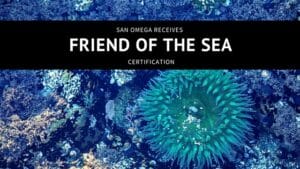
It’s easy to tell where your seafood comes from. If you buy it fresh, you can ask your fishmonger or read the packaging. If you buy it preserved, the label will tell you where it was caught.
Fish oil supplements are a little bit trickier. When you buy fish oil in liquid or capsule form, you might scratch your head at the label. Even if you go to the manufacturers websites, it can be difficult to know where the seafood is sourced and how it was caught. I slogged my way though multiple different omega 3 fish oil websites only to find rather vague information on where exactly the fish oil came from. The supplement industry has always been a bit like the “wild west” in the fitness industry, and that same attitude seems to prevalent among fish oil vendors as well. So how can you make ethical choices when it comes to your omega 3 supplements? One way you can ensure you are buying sustainable products is to purchase from companies who have attained certification.
Friend of the Sea (FoS) is a non-profit, non-governmental organization dedicated to conserving marine habitats and to educating consumers towards ethical seafood choices. Recently, San Omega, a Norwegian oil company which uses wild caught sardines, mackerels, and anchovies has recently achieved FoS status for their line of fish oils. This means that their fisheries are strictly managed to sustainability criteria, source only from stocks which have not been over exploited, and are limited in the fishing methods that they use. Currently, San Omega sourcing is both certified under FoS and IFFO (The Marine Ingredients Organization).
At Sushifaq, we want to say bravo to San Omega for showing how supplement companies can source ingredients in an ethical, sustainable way. It is so critical to the conservation of ocean life for consumers to be able to make informed, ethical choices, and proper certification in the supplement and omega three oil business is essential to that process.
I have always been fascinated by the creation and culture of different foods, particularly sushi and sashimi in the modern era of Japanese cuisine. I am a classically trained chef and sushi connoisseur, also having operated a food service company and enjoy investigating and experimenting with food around the world.
